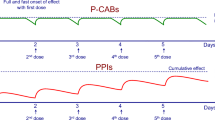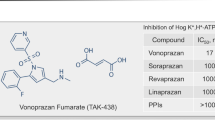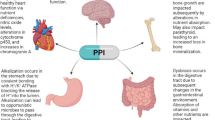Abstract
Purpose
Magnesium oxide (MgO), a short-term osmotic laxative, is converted into MgCl2 under acidic condition in the stomach and then Mg(HCO3)2 in the intestinal tract, where Mg(HCO3)2 induces the water exudation into the intestine. This indicates that the laxative effect of MgO could be attenuated under the suppressed gastric acid secretion. In this study, the possible interaction of MgO with gastric acid secretion inhibitors was evaluated by using electronic patient records of MgO dosage levels.
Methods
Defecation was controlled with MgO alone in some patients after colon surgery (n = 67) and after total gastric resection (n = 4). Some other patients were treated with a combination use of MgO and H2 receptor antagonist (H2RA) (n = 14) or proton pump inhibitor (PPI) (n = 27). The possible drug interaction of MgO with H2RA or PPI was evaluated by comparing dosage levels of MgO used in controlling defecation.
Results
In controlling defecation, the daily dosage levels of MgO in patients taking H2RA or PPI and patients with total gastric resection were significantly higher than those patients taking MgO alone after colon surgery. The ratios of good constipation control (controlled well at the dosing level of 1,000 mg MgO) in patients taking H2RA or PPI were significantly lower than that in patients treated with MgO alone. In an in vitro study, the solubility of MgO at pH 4.5 was quite low, as compared with that at pH 1.2.
Conclusions
When patients received H2RA or PPI, the laxative effect of MgO is decreased possibly due to the low solubility of MgO at the higher gastric pH and less generation of MgCl2 and Mg(HCO3)2. Higher dosing level of MgO or another laxative should be used in patients taking H2RA or PPI, as well as the case of patients with total gastric resection.
Similar content being viewed by others
References
Nakamura T (1992) Side effects of long-term use of magnesium oxide. Nihon Iji Shimpo 3540:177–178
Howden CW, Hunt RH (1987) Relationship between gastric secretion and infection. Gut 28:96–107
Cook GC (1985) Infective gastroenteritis and its relationship to reduced gastric acidity. Scand J Gastroenterol Suppl 111:17–23
Mahachai V, Reilly P, Thomson AB (1984) Comparative effects of pirenzepine and cimetidine, alone and in combination, on 24-hour gastric acidity in duodenal ulcer disease. Clin Ther 7:98–111
Hongo M, Ohara S, Hirasawa Y, Abe S, Asaki S, Toyota T (1992) Effect of lansoprazole on intragastric pH. Dig Dis Sci 37:882–890
Blum RA, Shi H, Karol MD, Greski-Rose PA, Hunt RH (1997) The comparative effects of lansoprazole, omeprazole, and ranitidine in suppressing gastric acid secretion. Clin Ther 19:1013–1023
Huang JQ, Goldwater DR, Thomson AB, Appelman SA, Sridhar S, James CF, Chiu YL, Pilmer BL, Keith RG, Hunt RH (2002) Acid suppression in healthy subjects following lansoprazole or pantoprazole. Aliment Pharmacol Ther 16:425–433
Röhss K, Wilder-Smith C, Nauclér E, Jansson L (2004) Esomeprazole 20 mg provides more effective intragastric acid control than maintenance-dose rabeprazole, lansoprazole or pantoprazole in healthy volunteers. Clin Drug Invest 24:1–7
Fimmel CJ, Etienne A, Cilluffo T, von Ritter C, Gasser T, Rey JP, Caradonna-Moscatelli P, Sabbatini F, Pace F, Bühler HW (1985) Long-term ambulatory gastric pH monitoring: Validation of a new method and effect of H2 antagonists. Gastroenterology 88:1842–1851
Merki HS, Witzel L, Walt RP, Neumann J, Scheurle E, Mappes A, Krammisch H, Heim J, Kaufmann D, Roehmel J (1988) Double blind comparison of the effects of cimetidine, ranitidine, famotidine and placebo on intragastric acidity in 30 normal volunteers. Gut 29:81–84
Author information
Authors and Affiliations
Corresponding author
Rights and permissions
About this article
Cite this article
Yamasaki, M., Funakoshi, S., Matsuda, S. et al. Interaction of magnesium oxide with gastric acid secretion inhibitors in clinical pharmacotherapy. Eur J Clin Pharmacol 70, 921–924 (2014). https://doi.org/10.1007/s00228-014-1694-x
Received:
Accepted:
Published:
Issue Date:
DOI: https://doi.org/10.1007/s00228-014-1694-x




